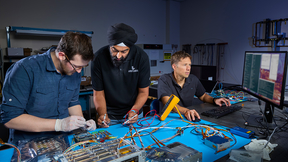National Academies tap LLNL scientist for panel
 (Download Image)
LLNL's Jonathan Allen, a bioinformatics scientist, has been selected to study microbial communities for the U.S. National Academies of Sciences. Photo by Julie Russell/LLNL
(Download Image)
LLNL's Jonathan Allen, a bioinformatics scientist, has been selected to study microbial communities for the U.S. National Academies of Sciences. Photo by Julie Russell/LLNL
A Lab bioinformatics scientist has been selected to serve on a U.S. National Academies of Sciences, Engineering and Medicine panel that will study microbiomes in "built environments."
Jonathan Allen, a researcher in Lawrence Livermore's Global Security Program, has been chosen to be part of the 15-member committee that will study microbiomes, or microbial communities of organisms growing in the environment, in buildings and other areas.
The panel, which will conduct its study over the next 18 months and hold its first meeting in mid-April in Washington, D.C., is sponsored by the Sloan Foundation, the Environmental Protection Agency, the National Institutes of Health and the National Aeronautics and Space Administration.
"I’m excited to participate as a member of this panel because it gives a unique opportunity to examine the critical challenges facing a field that is likely to have a major impact on science in the next decade," Allen said.
"People are beginning to understand that the microbial communities have an important impact on human health, irrespective of where they’re growing."
Microbial communities can be everywhere, in people’s gastrointestinal tracts, air ducts, water supplies and even in space, in the International Space Station, Allen said.
In addition to the space station, other examples of "built environments" are cars, subways, hospitals — where researchers would want to limit the spread of infectious disease — and other buildings, where the aim would be to increase energy efficiency and reduce rates of building degradation.
"At this point, there is a limited understanding of the mechanisms of how microbiomes affect ‘built environments,’" Allen said.
The National Academies study will assess the base of knowledge on the microbiome/built-environment interface and identify key research gaps. These gaps need to be addressed so emerging microbial knowledge can be applied in ways that positively impact building infrastructure design and human health.
A nine-year Lab employee, Allen led a team that in 2013 developed the Livermore Metagenomic Analysis Toolkit (LMAT), which is a collection of software programs that provide an accurate comparison of metagenomic data sets against large collections of already-sequenced human and microbial genomes.
LMAT uses about three times more referenced genomes than other published methods and employs unique search algorithms that exploit large memory computer architectures.
"The importance of a larger database is that it helps to provide a more accurate reflection of the true genetic diversity of the microbial world when surveying microbial communities," Allen said.
Contact
 Stephen Wampler
Stephen Wampler
[email protected]
(925) 423-3107
Related Links
The U.S. National Academies of Science, Engineering and Medicine“Microbiomes of the Built Environment: From Research to Application”
“A faster and cheaper method to detect agents of disease"
“Two-part microbial detection enhances bioidentification”
Tags
HPC, Simulation, and Data ScienceComputing
Global Security
Science
Featured Articles







